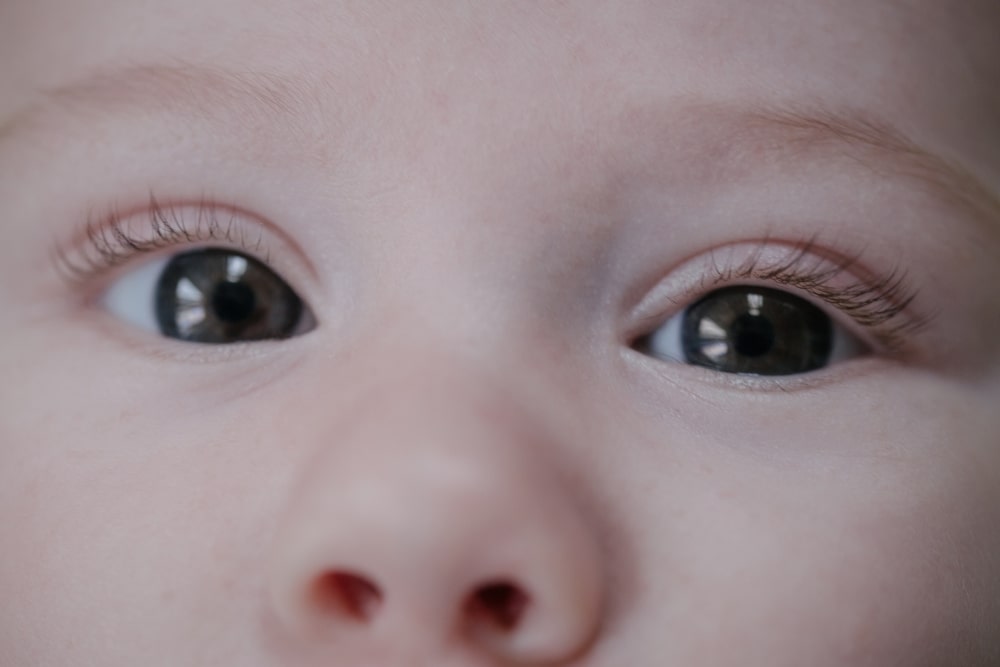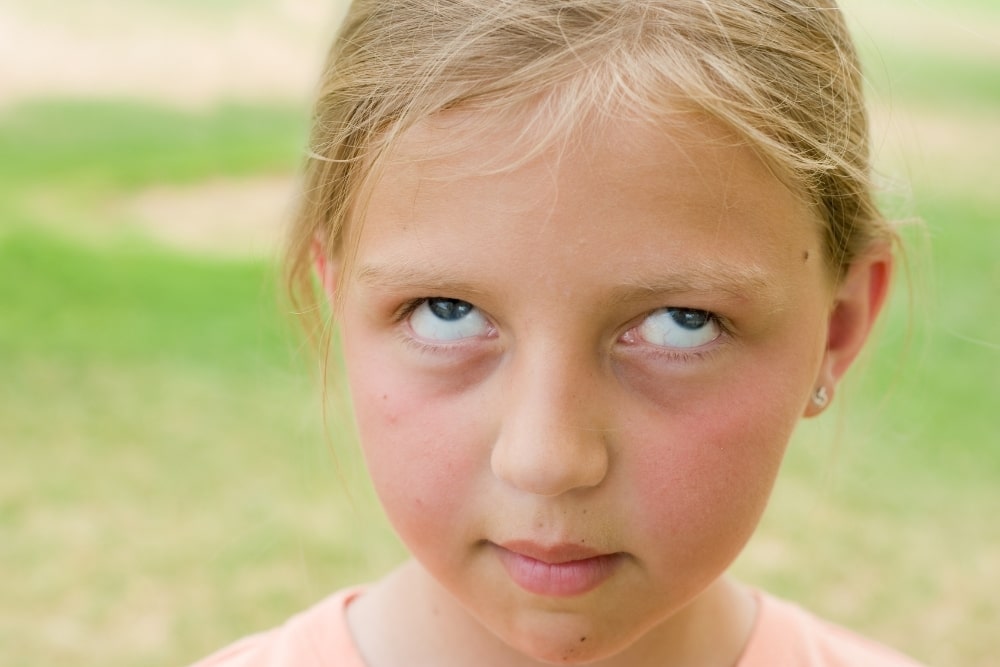Babys Eyes Roll Back When Feeding
We're supported by moms. When you buy through links on our site, As an Amazon Associate, I may earn a commission.
As parents, we worry about every little sneeze, cough, and twitch that our baby has.
It is understandable how much we worry, after all, we just want the best for our children and if you are a new parent with little experience of children it can be an even more worrying time.
View in gallery 
New parents often find it challenging to make a judgment as to whether or not their baby's behavior falls within the parameters of normal developmental behavior.
After all, anyone who has ever experienced the normal movements, sounds, and behavior of a newborn can understand why a new mom or dad would find them odd.
Unusual behaviors, movements, and sounds in babies are often nothing to worry about and are simply your little one getting to grips with their own body and what it can do.
Eye rolling can also fall into this category of being just a learning curve but it can also suggest that there is more going on.
We are going to look at some causes of eye-rolling and answer the question: why is my toddler rolling their eyes upward back into their head?
Table of Contents
- 1 Should You Worry About Your Baby's Rolling Eye Movements?
- 2 Rolling Eyes – Possible Causes
- 2.1 Because He Can
- 2.2 Newborn Movements
- 3 Injuries and Illnesses That Can Cause Eye-rolling in Babies
- 4 Neurological Reasons For Eye-Rolling In Infants
-
- 4.0.1 Paroxysmal Tonic Upgaze
- 4.0.2 Paroxysmal Downgaze
- 4.0.3 Infantile Spasms
-
- 5 The Final Thought
Should You Worry About Your Baby's Rolling Eye Movements?
As adults, we often roll our eyes as a passive-aggressive response to something we dislike. But it is highly unlikely that your toddler is using it in this way unless their social skills are developed well beyond their physical age.
So it is understandable that you would be concerned that your toddler has begun to roll their eyes. You are probably asking yourself many questions such as why does he roll his eyes? Is it normal for a toddler to roll his eyes?
The quick answer is going to be no. Most babies do not roll their eyes unless they are asleep although there are a few other benign reasons why they may roll their eyes. Let's look at some of the reasons that toddlers may roll their eyes.
Rolling Eyes – Possible Causes
View in gallery 
Because He Can
Babies are fantastic, inquisitive humans, and they are learning and discovering new things every single day.
Sometimes these discoveries are to do with their environment but more often than not they are to do with their own body and what a fantastic piece of tech to have at your fingertips.
This is where one of the most common reasons for eye-rolling comes from especially in toddlers. It is a simple fact that it is a new skill they have learned to do and so they are going to keep practicing and using their newly acquired skill.
Another reason that your baby may be rolling their eyes is to soothe themselves. When children get angry or frustrated they often choose strange and not very logical ways to soothe their frustration.
This can be done by rolling their eyes, banging their heads on the floor, or even hitting themselves. And of course, this gets them all the attention from their caregivers which is an added bonus for your baby.
Newborn Movements
Newborns are still developing their muscle control and control of their bodies – there is a lot for them to learn and get to grips with. So if your newborn is rolling their eyes it may be because their eyes are not developed enough.
The eye-rolling can happen especially when your baby is tired or sleeping. This is considered normal for a newborn and is just a part of their development.
Injuries and Illnesses That Can Cause Eye-rolling in Babies
However, there are cases where eye-rolling in toddlers can be a matter of concern.
Here are a few reasons why a baby may be rolling their eyes;
- Head injuries
- Seizures
- Low blood sugar
- Hypoglycemia
If there is a possibility that your baby may have had a bump to the head by falling off the bed or something similar then you should seek medical attention immediately.
Neurological Reasons For Eye-Rolling In Infants
If there is an underlying neurological problem causing your baby to eye-roll then there would usually be other symptoms alongside the eye-rolling.
These could be anything from trembling to shaking and these may be some questions that you should be thinking about too.
- Are they doing it intentionally?
- Are there any there symptoms?
- Is there something else going on that is unusual?
These are some examples of neurological conditions that are sometimes found in babies that roll their eyes. They are Paroxysmal tonic upgaze, Paroxysmal downgaze, and infantile spasms.
Paroxysmal Tonic Upgaze
This is a condition where the main and usually only symptom of the condition is recurrent episodes of sustained upward deviation of the eyes.
In layman's terms, this means that a child with this condition will have repeated episodes where their eyes move upwards as if looking at something high up.
The upward eye movements are not in keeping with what is going on around the child and will seem out of place. Here is an example of Paroxysmal tonic upgaze for you to have a clearer understanding of what the condition looks like.
Paroxysmal Downgaze
This condition will come with the opposite effects to Paroxysmal tonic upgaze in that the eyes deviate downward. Again there will be repeated episodes of downward eye movement that are not in keeping with the situation.
Infantile Spasms
If your child is suffering from infantile spasms then they will also have other noticeable symptoms such as the muscles in their arms and legs becoming stiff, their head becoming bent forward.
They often look like they have been startled. But along with these symptoms, they may also have slowed development or even lose skills that they had once mastered.
Both Paroxysmal tonic upgaze and Paroxysmal downgaze are usually benign and disappear without any treatment or intervention. The same can be said for infantile spasms.
But these conditions can only be diagnosed by a medical professional and if you have any doubts with regard to the underlying origin of the eye-rolling then you should seek medical advice sooner rather than later.
The Final Thought
Being a parent can be such a worrying time and the things that babies and toddlers do are often a huge cause for concern. Eye rolling is more often than not just a new skill that your little one is perfecting ready for their teenage years.
But if it is accompanied by any other unusual symptoms then it would be advised to contact a medical professional for further advice.
Medical Disclaimer. All content and media on the MomInformed Website is created and published online for informational purposes only. It is not intended to be a substitute for professional medical advice and should not be relied on as health or personal advice.
weaverwhismainfits74.blogspot.com
Source: https://mominformed.com/why-is-my-toddler-rolling-their-eyes-upward-back-into-their-head/
Отправить комментарий for "Babys Eyes Roll Back When Feeding"